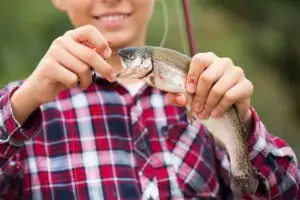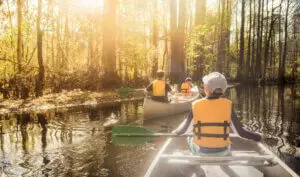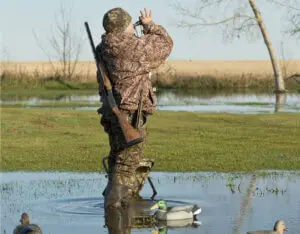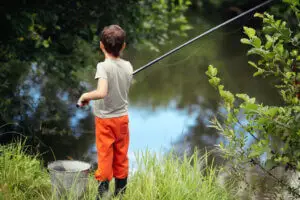A Series on the RA Virtues: Responsibility and Teamwork
April 17, 2024
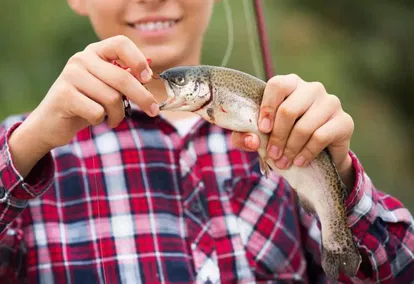
This blog is the fifth in a series on the RA Virtues.
Fishing was a team affair in our neck of the woods. By that I mean Mr. Earl was the coach, and we were the team under his direct (sometimes very direct) supervision.
Mr. Earl was a stickler on the creek bank. He had a particular way of going about the business of fishing, and he expected all within earshot — man, boy, and fish — to toe the line. For instance, when fishing from the bank, boys were not allowed to stand too near each other, not allowed to use artificial bait (“t’aint natural,” he would say), and only allowed to use cane-pole-type rigs (none of that fancy rod-and-reel stuff). If a boy were to get his line stuck in a tree, on an underwater stump, or another boy, it was up to him to unhook his catch.
All boys were required to use worms, usually procured from a church member who kept old chest-freezers-turned-worm-beds for just such occasions. Nobody knew quite how the old gentleman got his worms so big, but the rumor was he used the coffee grounds from the church coffee makers as worm food. Being as those were “holy grounds,” they made bigger worms. Boys could use crickets or shiners, but they were often store-bought, and thus highly disfavored.
Mr. Earl was extremely interested in making sure the boys enjoyed the fishing experience and never forgot “the least of these.” He took extra care to ensure the youngest Royal Ambassadors had an enjoyable time on our fishing trips, which were numerous.
Mr. Earl would position the youngsters of the first- and second-grade variety in their own spot where he could keep watch over them like a mother hen over her chicks. He would spend time teaching them to bait their own hooks and doing it for them if they could not. He was quick to take a fish off the hook for a boy and then praise his fishing prowess, no matter the size of the catch. He figured that a first- or second-grade boy was as prime a candidate to make fisherman-of-the-year as any grown man; he just needed encouragement and guidance.
The team business came on strong after the fishing was done. Mr. Earl believed that a man or boy who wouldn’t work shouldn’t eat, and that belief carried over to fishing. All boys and men who intended to dine on fish best be prepared to help clean fish, and they best bring their own pocketknife to assist.
Boys were not required to clean a certain quota of fish; they were expected to do their best to accomplish the goal, which was to get them all clean. Usually the first graders could maybe get one fish clean, and only then with lots of help from the older men. The sixth graders would turn it into a game with the prize being bragging rights for whoever cleaned the most fish.
Then came the frying. Small boys were assigned responsibilities like “mealing the fish,” older boys were in charge of frying (under the close supervision of the men), and middle-sized boys were in charge of setting the table and keeping the youngsters out of the fried fish.
Mr. Earl believed it was the responsibility of every boy to participate and that the business of getting a fish from the water to the table was much more efficient when we all worked as a team. The team accomplished more than one boy could ever do on his own trying to catch, clean, and fry fish. Thus, each boy had a responsibility to participate on the team.
Mr. Earl, who believed every lesson in Royal Ambassadors had a spiritual application if only we were astute enough to recognize it, had a field day with the applications of fishing.
Jesus called Peter and his brother Andrew to be “fishers of men,” and Mr. Earl believed that applied to Royal Ambassadors too. He believed Christians in general, and Royal Ambassadors in particular, were pledged “to work with others in sharing Christ” just as they were pledged to work together in fishing.
Today, we associate the virtues of responsibility and teamwork with that part of the RA Pledge where we promise to work with others in sharing Christ. And just as it was in Mr. Earl’s day with fishing, it’s important we all do our part to share Christ.
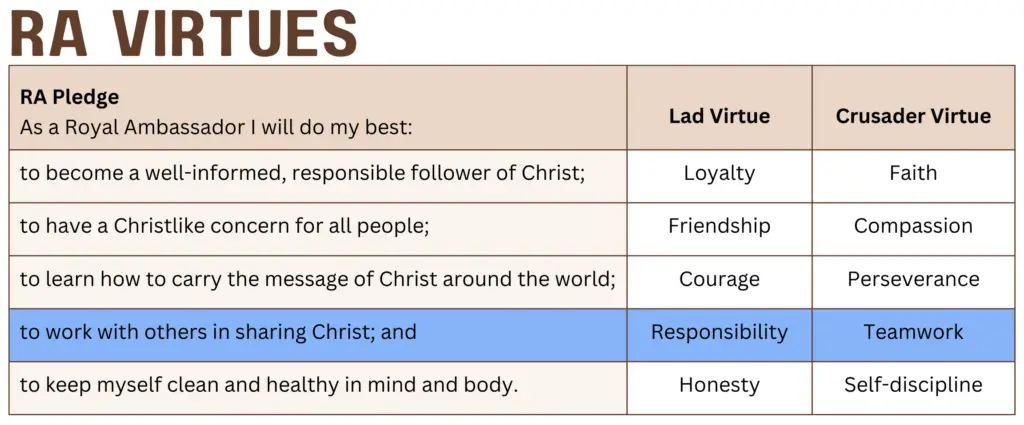
We might not all be able to travel to the ends of the Earth to share Jesus. But we can share Jesus where we are, and we can help those who do travel. We can support the Lottie Moon Christmas Offering® and Annie Armstrong Easter Offering® as well as our state’s missions offerings. We can give faithfully to our church and through them to the Cooperative Program, which itself is one of the greatest team efforts in history to reach the lost.
Missions is a team effort. We can do more together than we can separately. Mr. Earl taught us we can catch more fish, whether they be of the people variety or the fishy-fishy variety, when we work with others.
Keith Gates is the WMU ministry consultant for Royal Ambassadors, Challengers, and Youth on Mission. This article is the fifth in a series on the RA Virtues.

